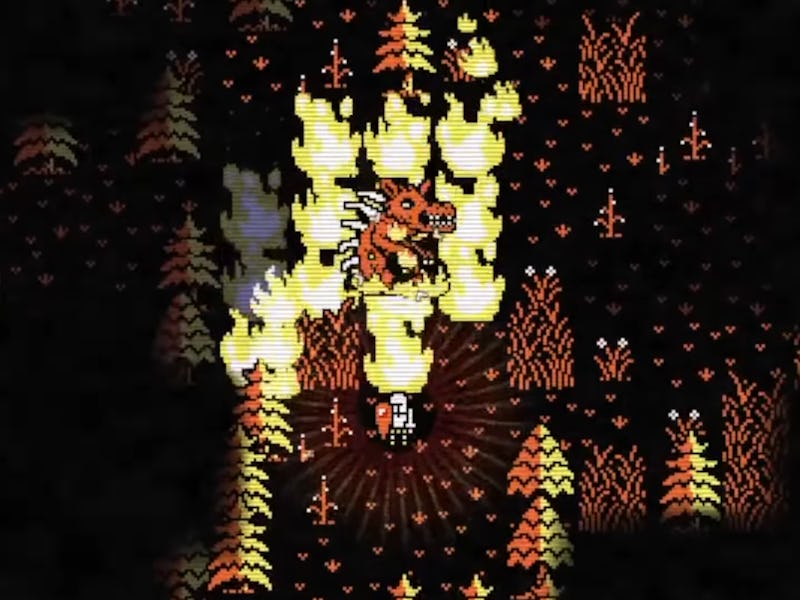The Creator of Fable Just Quietly Released a Fascinating Free RPG on Steam
In the name of the Moon!

Booting up Moonring for the first time can be a bewildering experience.
You wake up in a room made of checkered green and purple bricks, and already tutorials are flashing at the top of the screen. Outside your room, someone asks if you’ve had any dreams, and you answer by typing whatever you please. No one’s particularly interested in what you’re up to, leaving you to find your way through the world from the very start. You’ll likely be taken down by a beetle within the first few minutes.
Honestly, booting it up every time after that is still pretty bewildering.
From the first moment, Moonring is bursting with interlocking systems.
If you haven’t heard of Moonring before, that’s probably because it came more-or-less out of nowhere. The open-world RPG launched for free on Steam at the end of September with next to no ceremony, despite its intriguing pedigree. Its designer, Dene Carter, is one of the creators of Fable, and while Moonring is a vastly different game, more than a few threads connect the two.
According to Carter, Moonring is directly inspired by games like the first few entries in the Ultima series. For a more modern comparison, it’s got a lot in common with Caves of Qud, from its stripped-down presentation and deep layers of hidden systems to its surreal lore.
Moonring is an open-world, turn-based RPG, but not in the way those terms are commonly used. It’s turn based in that each step you take advances the world by one turn, with other characters, enemies, and even weather moving whenever you do. Stand still, and the world is forever halted. It’s open-world in that you’re truly free to go anywhere and do anything. No Witcher 3-esque branching questlines or Ubisoft-style maps crawling with points of interest. Just a world there for you to explore, one tile at a time.
If you’ve got a thing for complex menus, you’re gonna love Moonring.
Owing to its old-school inspirations, Moonring looks simplistic and overwhelming at the same time. Seen from a top-down point of view, its characters and environments are rendered in a detail-light style that could mostly have been pulled off by computers in the late ’80s, with some fancy atmospheric effects on top. But stretching across the left-hand side of the screen is a readout crammed with so much inscrutable information it would make Dark Souls’ equipment menu weep.
Bars showing your health, energy, food supplies, light levels, and more fill and deplete near the top. Strange icons clutter much of the menu, some representing actions and some representing more stats. The centerpiece is an ever-scrolling text log, keeping track of everything you do in the world, from stabbing a hedgehog to being afflicted by the world’s pervasive, mind-altering fog. It’s a lot to take in, and you’re almost guaranteed to lose a few times because you failed to notice some crucial part of the HUD.
That may sound like a complaint, but it actually points to what makes Moonring so special. There is so much going on at all times that your puny human brain may have trouble even parsing it. Like with the absurdly detailed simulation of Dwarf Fortress, learning to play Moonring is partly about learning to understand what everything on screen even means and how it affects everything else.
And beyond the big-picture systems tracked by Moonring’s impressive HUD, things get even weirder. Five gods watch over its world of Caldera, granting you power if you earn their favor — even if you do so accidentally. A complex magic system is there for you to find, but you’ll have to put in the work to figure it out for yourself. A misty substance called Amber consumes much of the world, driving anyone who spends too long in it mad and revealing creatures most people never see.
Moonring is complex, surprising, inscrutable, and absolutely worth playing.
Upon release in 2004, Fable was lauded for its open-ended gameplay and player choice that wasn’t yet the norm in mainstream RPGs. Moonring offers a more expansive form of freedom that’s about removing restrictions from player action rather than adding scripted ways for the world to react.
The two games could hardly be more different. But to see one of Fable’s creators still pushing the boundaries of player freedom and choice 20 years later makes Moonring even more fascinating. Released by a large studio and angling for commercial success, Fable was limited by mainstream expectations. As a free game created by a single designer, Moonring is able to spread its bizarre, beautiful little wings and pursue its own eccentric goals.
Moonring is available for free on Steam.
This article was originally published on